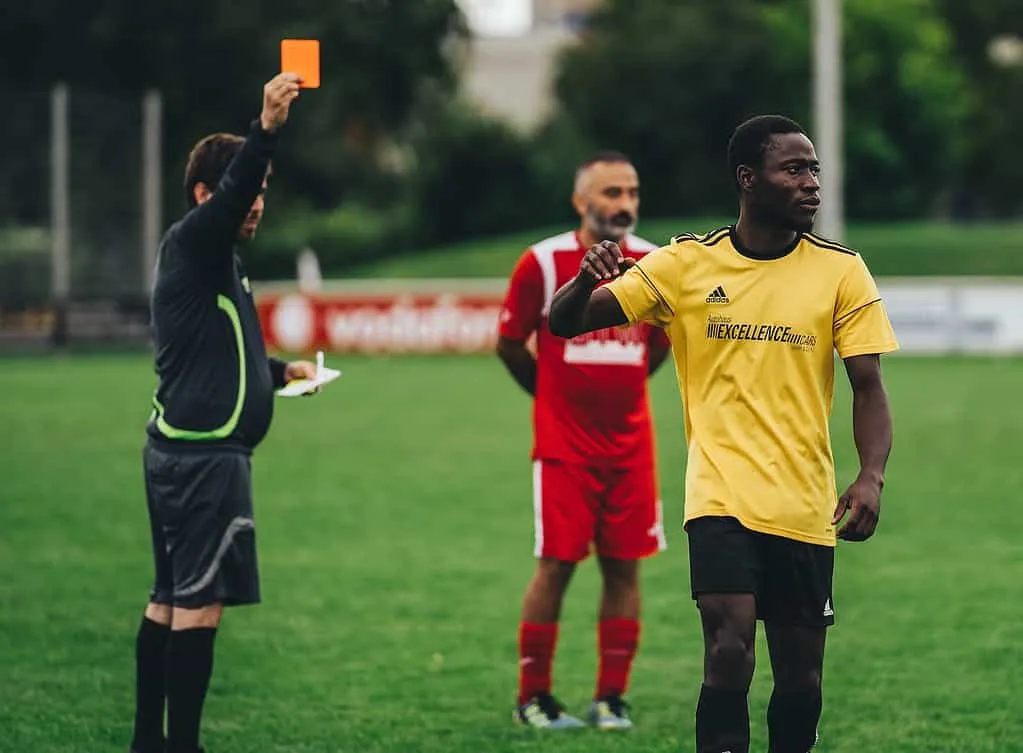In the span of his distinguished career, Lionel Messi, revered globally as a football titan, has been on the receiving end of the red card just three times, a fact that sparks curiosity among spectators and analysts across the globe.
This relatively low number, given his dynamic and often assertive style of play, generates intrigue, encouraging a closer look at these sporadic instances.
As we delve into this narrative, we will illuminate the circumstances surrounding these occurrences, painting a comprehensive picture of these rare and impactful moments in Messi’s stellar journey through the ranks of professional football.
What is a Red Card?
In the game of soccer, a red card is a significant disciplinary action taken by referees against soccer players who commit serious offenses on the field.
It is a penalty that indicates the player must leave the pitch immediately and cannot be replaced for the rest of the match.

A red card is different from a yellow card. It is typically shown for offenses such as dangerous tackles, violent conduct, aggressive behavior, deliberate handball, or denying an obvious goal-scoring opportunity.
Explanation of a Red Card in Soccer
When a player is shown a red card, it means that they have committed a severe offense that goes against the rules and spirit of the game.
The red card serves as a punishment for their actions and ensures fair play is maintained on the field.
Consequences of Receiving a Red Card
Receiving a red card has immediate consequences for both the player and their team. The player is suspended for the next match and may face additional punishment depending on the severity of the offense.
Their team is left with a numerical disadvantage, playing with one fewer player, which can significantly impact their performance and chances of winning the game.
Red Card Rules and Regulations
The rules and regulations regarding red cards are governed by various soccer authorities, including FIFA, UEFA, and individual football associations.
These governing bodies have specific guidelines for referees to follow when issuing red cards, ensuring consistency and fairness in disciplinary actions.
Lionel Messi’s Disciplinary Record
Throughout his illustrious career, Lionel Messi has managed to avoid many red cards, which is a testament to his professionalism and control on the field.
However, like any passionate and competitive player, Messi has received red cards on a few occasions for both the national team and Barcelona.
Number of Red Cards Lionel Messi Has
Lionel Messi has a relatively clean disciplinary record when it comes to red cards. As of 2021, Messi has received a total of three red cards.
These incidents, although rare, have been significant talking points in the football world.
It is worth noting that Messi’s red card count is significantly lower in comparison to his rival Cristiano Ronaldo.
Comparison of Messi’s Red Cards to Other Players
When comparing Messi’s red card record to other players, it becomes evident that he has maintained a higher level of discipline throughout his career.
While Messi has received three red cards, players like Sergio Ramos and Zlatan Ibrahimovic have accumulated more red cards in their respective careers.
Messi’s Disciplinary Record in Different Leagues
Messi’s disciplinary record extends beyond his domestic league with the Catalan team, where he has had a relatively low number of red card incidents.
However, in international matches, particularly during competitive tournaments like the Copa America, Messi’s temperament has been tested multiple times.
Instances of Messi Receiving Red Cards
Despite being known for his calm and composed demeanor, Lionel Messi has found himself shown a red card on a few occasions throughout his career.
Let’s take a closer look at some of these noteworthy incidents.
Describing Specific Occasions When Messi Was Shown a Red Card
One memorable red card incident involving Messi occurred during a match between Argentina and Chile in the Copa America.
In the heated match, Messi was involved in a controversial altercation with Gary Medel, resulting in both players being shown red cards.
The decision caused quite a furore as Messi’s actions were deemed far from excessively aggressive. This episode resulted in Messi’s suspension for a game and a $1500 penalty.
Messi’s First Red Card
In 2005, a young Messi, barely 18, was served with his first red card shocker while playing his inaugural match for Argentine in a friendly against Hungary.
Supposedly having responded to a foul from a Hungarian opponent Vilmos Vanczak , Messi was shown the red card barely two minutes into his entry. Despite his appeals, the decision remained unaltered.
Red Card Incidents in fc Barcelona
Out of his three red cards, Messi’s solitary red card for Barcelona occurred in the Spanish Super Cup final of January 2021.
Messi’s collision with Asier Villalibre was only noticed after a VAR review, following which Messi was dismissed.
The Impact of Red Cards on Messi’s Career
Receiving red cards can have significant implications for a player’s career, both on an individual level and for their team. Let’s explore the impact red cards have had on Lionel Messi throughout his career.
Influence on Messi’s Team Performance
When Messi is sent off with a straight red card, it creates a disadvantage for his team, forcing them to play with ten players against the opponent’s eleven.
This numerical disadvantage can disrupt the team’s strategy and provide the opposition with an opportunity to exploit the situation.
Evaluating Messi’s Behavior and Improvements
Messi’s disciplinary issues have led to self-reflection and improvements in his behavior on the field. Over the years, he has shown a greater sense of maturity and control, reducing the frequency of reckless challenges and confrontations.
Red Card Controversies Involving Messi
Messi’s red card incidents have not been without controversy. Some argue that he has been unfairly targeted by referees due to his reputation as one of the best players in the world.
Controversial decisions have sparked debates among fans and pundits, further highlighting the attention and scrutiny Messi faces.
Red Card Offenses and Messi’s Style of Play
Messi’s style of play is characterized by his superb dribbling, agility, and exceptional goal-scoring ability. However, his attacking nature can sometimes lead to aggressive challenges and, consequently, red cards.
Let’s delve into the types of offenses that have resulted in red cards for Messi and how it affects his playing style.
Types of Offenses Leading to Red Cards for Messi
Messi has been shown red cards for offenses such as dangerous tackles, retaliatory actions, and arguments with referees.
These incidents demonstrate the intensity with which he plays the game and the emotions that can occasionally get the better of him.
Messi’s Response to Receiving a Red Card
In the face of a red card, Messi has shown resilience and a desire to learn from his mistakes. He accepts the consequences of his actions, acknowledges any wrongdoing, and aims to improve his behavior in future matches.
How Red Cards Affect Messi’s Playing Style
The presence of red cards in Messi’s career has led to a more cautious and measured approach to his playing style.
While still displaying his trademark brilliance, he now avoids unnecessary challenges and confrontations to minimize the risk of being sent off.
Lionel Messi’s career serves as a testament to his unparalleled skills, a quiet yet firm sportsman spirit, and an excellent discipline record.
His three red card incidents remain outliers in his otherwise immaculate professional journey.
As fans, these episodes offer us rare glimpses into the heated moments of the beautiful game and remind us of the intense pressures and passions that simmer under the surface.
Through it all, Messi’s legacy, marked by his calm demeanor and infrequent brushes with football’s disciplinary measures, stands as a striking example to upcoming generations.
